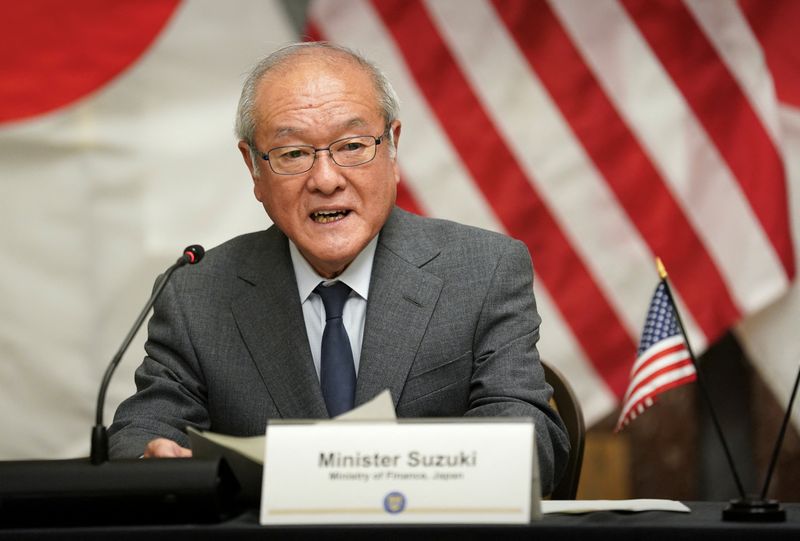
Leika Kihara and Satoshi Sugiyama
TOKYO (Reuters) – The Bank of Japan could take monetary policy action if the yen’s fall significantly affects prices, Governor Kazuo Ueda said on Wednesday, giving his strongest hint yet: the currency’s relentless decline could trigger new interest rate hikes.
Ueda also said the Bank of Japan could raise interest rates sooner than expected if inflation exceeds forecasts or if there is a risk of a higher price outlook.
Finance Minister Shunichi Suzuki expressed “strong concern” on Wednesday about the negative impact of a weak yen, such as higher import costs, and reiterated Tokyo’s willingness to intervene in the market to support the weakening currency.
The statements, coming after a meeting between Ueda and Prime Minister Fumio Kishida on Tuesday, underscore the government and central bank’s determination to work together to curb the yen’s crippling fall.
“We must be mindful of the risk that the impact of currency volatility on inflation becomes stronger than in the past” as firms are already increasingly looking to raise prices and wages, Ueda told parliament on Wednesday.
“Exchange rate movements can have a big impact on the economy and prices, so there is a possibility that we will have to respond with monetary policy,” he said.
The remarks could be compared to those Ueda made after the Bank of Japan’s policy meeting on April 26, when he said the recent fall in the yen had no immediate impact on inflation.
Some traders said Ueda’s comments after the meeting accelerated the yen’s fall as it fueled market expectations that the Bank of Japan will delay raising interest rates from current levels near zero for some time.
remove advertising
.
After the yen hit a 34-year low of 160.245 to the dollar on April 29, Japanese authorities are suspected of spending more than 9 trillion yen ($58.4 billion) on market interventions to support the currency last week.
The dollar held at 155.40 yen on Wednesday, up from a roughly one-month high of 151.86 on May 3.
ON THE PLAN TO INCREASE TARIFFS
Speaking at a seminar later on Wednesday, Ueda said a “sharp, one-sided” fall in the yen was undesirable because it was damaging to the economy.
He also said the inflation trend is moving “firmly” toward the BOJ’s 2% target as the virtuous cycle of wage inflation and inflation becomes more robust, underscoring the central bank’s belief that conditions are in place for additional rate hikes.
The BOJ will “adjust the degree of monetary accommodation” (code for rate hikes, according to BOJ observers) if the inflation trend accelerates to its 2% target as it forecast, Ueda said, signaling the possibility of rate hikes in the near future. in several stages over the coming years.
“If inflation exceeds our forecasts or if growth risks become high, we would be wise to adjust interest rates earlier,” he said.
“On the other hand, if inflation falls below levels or downside risks increase, we should maintain current favorable financial conditions for a longer period.”
The Bank of Japan ended negative interest rates and other remnants of its sweeping stimulus in March. Many market players expect the Bank of Japan to raise rates from current levels near zero sometime later this year.
Regarding the BOJ’s bond purchases, Ueda said the central bank will maintain the size of its purchases for now to carefully study how markets will perceive the March policy changes.
remove advertising
.
However, he said it would be prudent to reduce bond purchases in the future.


